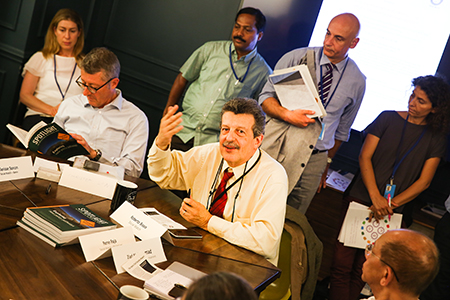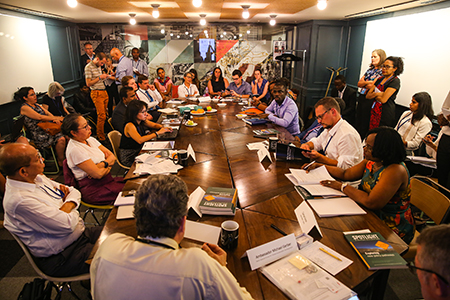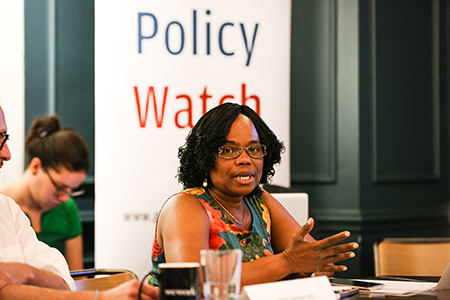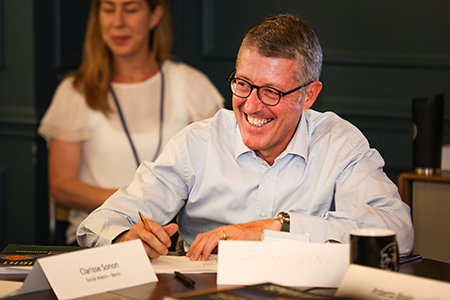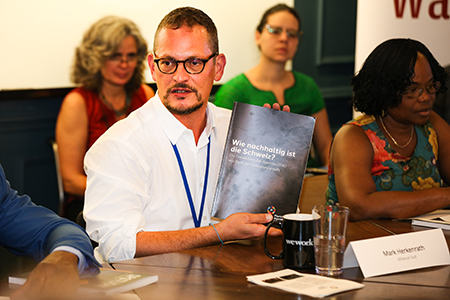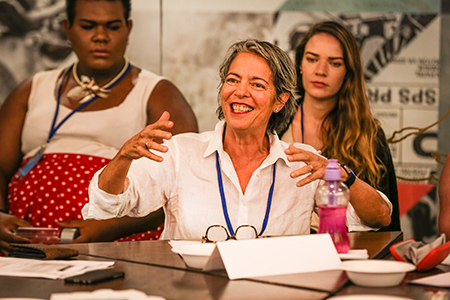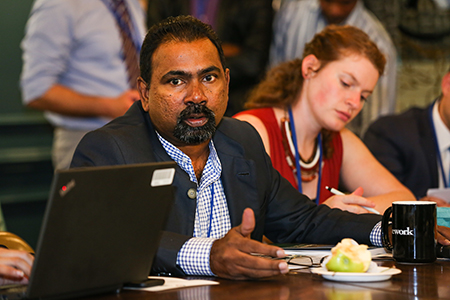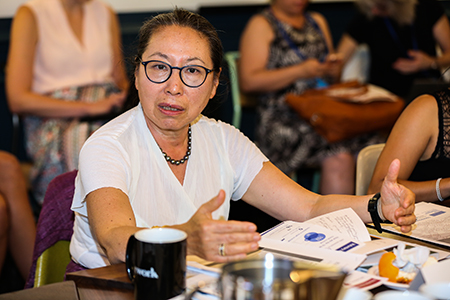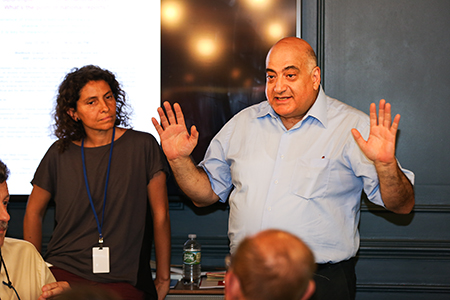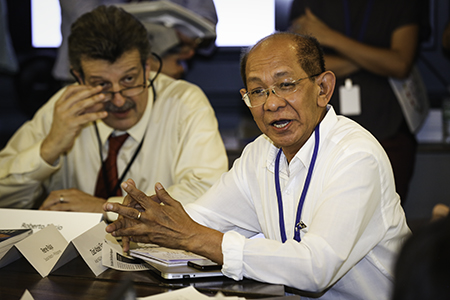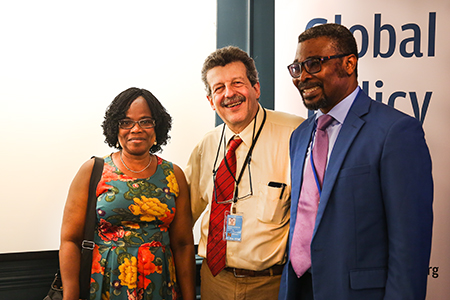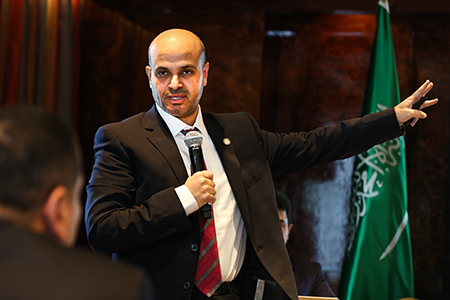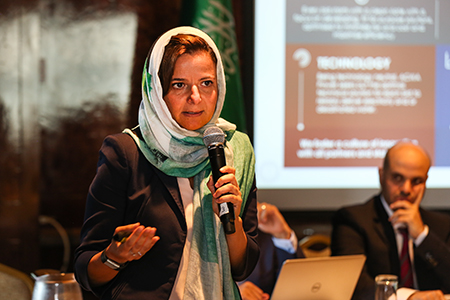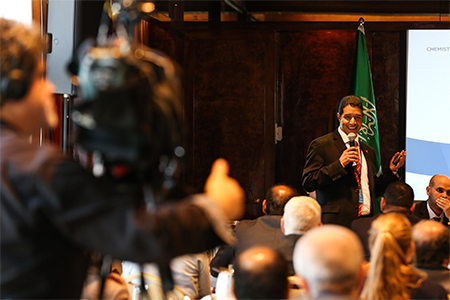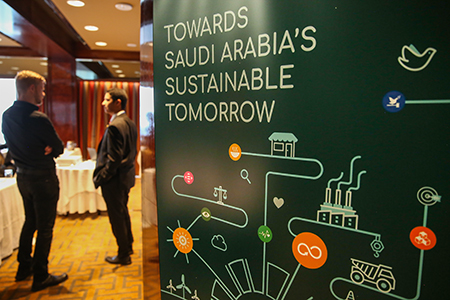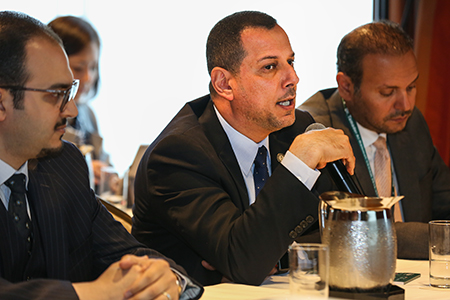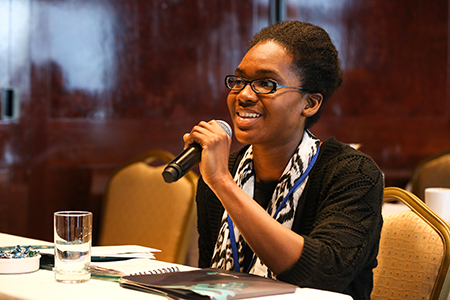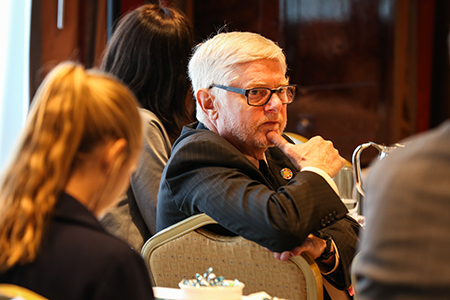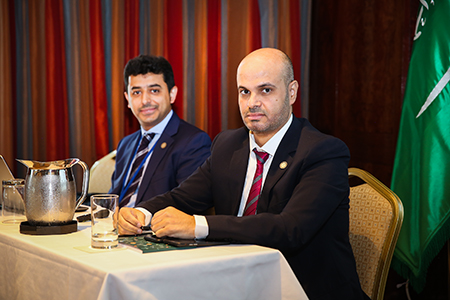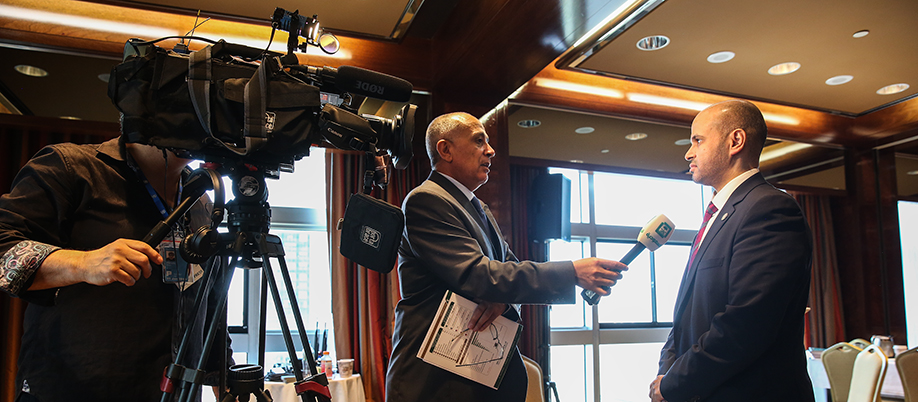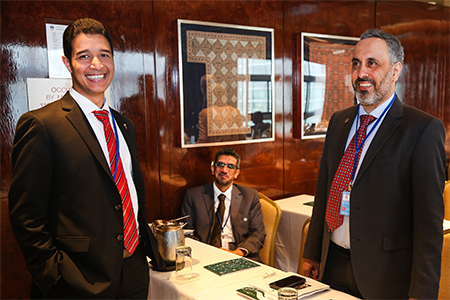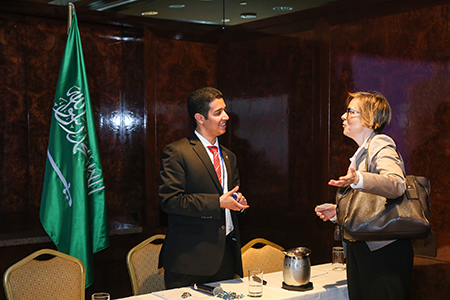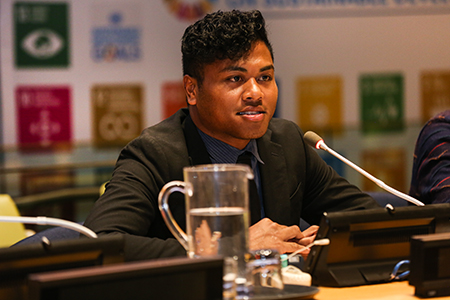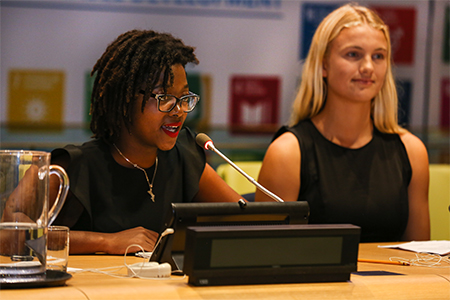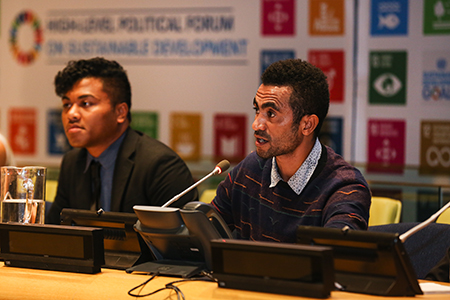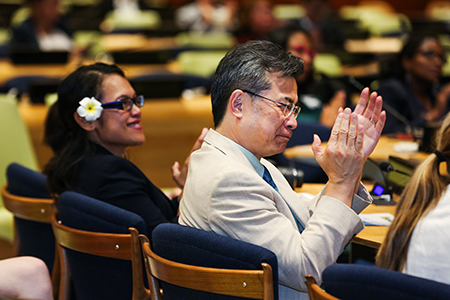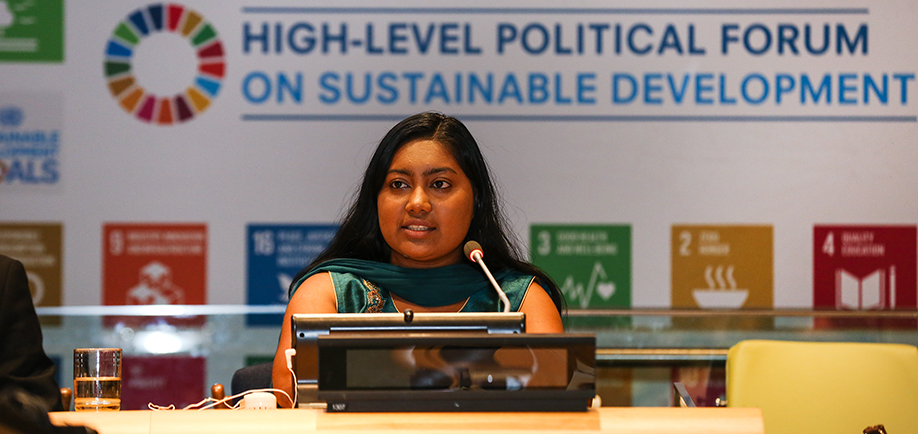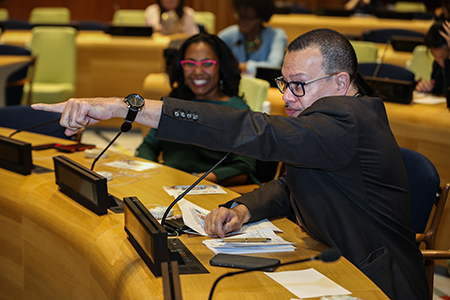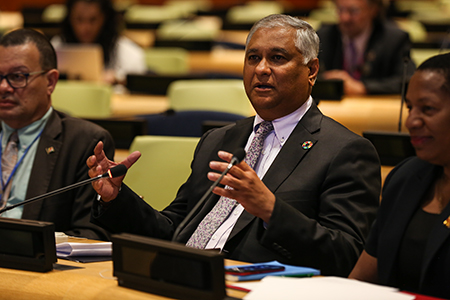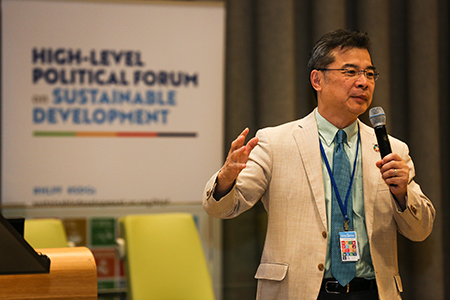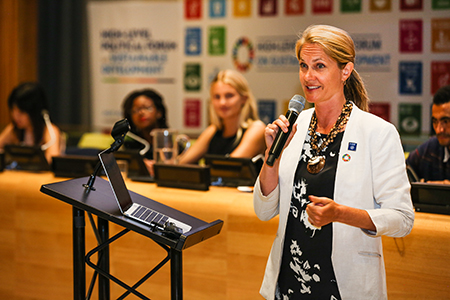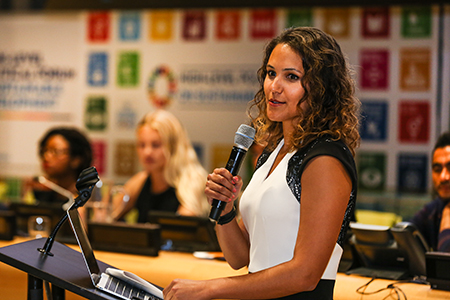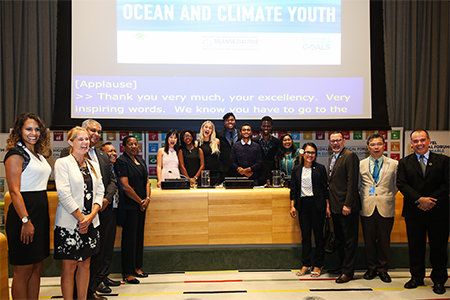Summary
The following events were covered by IISD Reporting Services on Friday, 13 July, 2018:
- SDG Implementation at National Level: What’s the Point of National Reports?
- Energy in the Kingdom of Saudi Arabia
- Global Partnerships for Education, Youth Engagement and Sustainable Tourism
Photos by IISD/ENB | Natalia Mroz
For photo reprint permissions, please follow instructions at our Attribution Regulations for Meeting Photo Usage Page
SDG Implementation at National Level: What’s the Point of National Reports? Presented by Global Policy Forum, Social Watch, Alliance Sud, and Arab NGO Network for Development
This event focused on voluntary national reports (VNRs) and parallel “shadow” or “spotlight” reports generated by civil society organizations (CSOs) on progress towards attaining the Sustainable Development Goals (SDGs).
Moderator Roberto Bissio, Social Watch, asked presenters to address whether the shadow reports lead to changes and what can be learned from each other’s experiences.
Blanche Sonon, Social Watch, Benin, said her government has been open to CSO input. She highlighted the need for a focus on detecting and returning government funds lost through corruption.
Mark Herkenrath, Alliance Sud, outlined an effort to create a joint report, organized thematically, with input from different sectors of civil society, including human rights, women, youth, and environmental organizations. He described a joint chapter-writing exercise with the private sector, noting the final baseline report was not included in the Swiss VNR. He said CSO involvement in the VNR process does not preclude a separate spotlight report.
Iara Pietricovsky de Oliveira, Instituto de Estudos Socioeconômicos, said a CSO spotlight report concluded that Brazil is going backwards on all the SDGs and that recommendations using data collected by CSO researchers and institutions were not addressed by the government.
Rene Raja, Social Watch, Philippines, noted his country will present its second VNR in 2019 and highlighted aspects of its spotlight report, including on how to establish baselines for the SDGs. He emphasized the need to address inequality, education, and empowerment, and underscored engaging with local, regional and national sectors to increase solidarity.
Christoph Lang, Swiss Agency for Development and Cooperation, said his country would present its VNR at this HLPF and is working with 85 indicators. He stressed: the importance of broadening civil society engagement; CSO inclusivity for better reports; and openness to improving the process.
Sakiko Fukuda-Parr, New School, outlined work on review of the SDGs by the Committee on Development Policy, a subsidiary advisory body of the UN Economic and Social Council. She said the intent of the review was to nudge governments to do better and emphasized focusing on the issue of no one left behind.
A CSO representative from Sri Lanka said VNRs need to be an honest stock-taking and that his country’s CSO process included trade unions, private sectors, local authorities and government offices, who were excluded from the VNR process. He highlighted: availability of data on only 46 indicators; the importance of SDG interlinkages; and the need for a data acceptance mechanism to expand the ability to include data from non-traditional sources
During ensuing discussion, participants considered, inter alia: use of advocacy to organize grassroots voices; inclusion of children and youth as contributors to CSO reviews; the complementary nature of qualitative and quantitative analyses; and private sector involvement in the review process, including challenges when private sector demands are inconsistent with attainment of the SDGs.
Roberto Bissio, Social Watch
The side event convening at a local shared workspace
Blanche Sonon, Social Watch, Benin
Christoph Lang, Swiss Agency for Development and Cooperation
Mark Herkenrath, Alliance Sud
Iara Pietricovsky de Oliveira, Instituto de Estudos Socioeconômicos
Sakiko Fukuda-Parr, New School
Participants share perspectives on voluntary national reports
Rene Raja, Social Watch, Philippines
Participants before the event
Contact:
- Roberto Bissio
| socwatch@socialwatch.org
More Information:
Energy in the Kingdom of Saudi Arabia
Presented under the leadership of Ministry of Energy, Industry and Mineral Resources, Government of Saudi Arabia
This side event showcased best practices on fostering energy efficiency in Saudi Arabia through public-private partnerships in the construction, transportation and industrial sectors.
Moderator Mustafa Alshehri, Saudi Basic Industries Corporation (SABIC), opened the event and stressed his country’s efforts to achieve the SDGs by improving energy efficiency through public-private partnerships.
Ahmed Alzahrani, Saudi Energy Efficiency Center (SEEC), noted that three sectors, building, industry, and transportation, account for over 90% of national energy consumption, and said SEEC’s energy efficiency program promotes: full coordination among governments and the private sector; human capital development, including certification programs; and awareness raising and media campaigns on efficiency. He noted the importance of addressing energy efficiency by managing both the demand and supply sides of their businesses, highlighting that SEEC’s program considers end-users as important stakeholders. He emphasized that its initiatives help create business opportunities and quality jobs in Saudi Arabia.
Yara Anabtawi, ACWA Power International (ACWA Power), explained her company is a developer, investor, co-owner, and operator of power generation and desalinated water production plants. She said ACWA Power produces more than 23 GW of electricity and 2.5 million cubic meters of clean water per day. She stressed that the company reduced the cost and tariff in renewables by applying a “cost leadership” business model, highlighting the first utility-scale renewable energy project in Saudi Arabia, the 300 MW Skaka IPP PV solar project. She said the project aims to generate 9.5 GW of renewable energy by 2023. Anbtawi also noted contributions to sustainability, including: assuring legal and regulatory compliance requirements; investing in socio-economic development by creating shared values; and continuing to champion sustainability in the power sector.
Hamed Al Harthy, , SABIC, said sustainability is at the core of the SABIC 2025 Strategy, which includes company-wide goals to achieve, by 2025, a 25% reduction in greenhouse gas emissions, energy, and water intensities, and a 50% reduction in material-loss intensity, using 2010 as a baseline. Noting that SABIC achieved 7.6% energy intensity reduction from the 2016 baseline, he said the company remains committed to improving resource and energy efficiency by: implementing the corporate energy policy; better energy management systems that improve coordination across stakeholders in the supply chain; and exploring energy innovation and renewables.
In ensuing discussion, participants commented on: information gaps between Saudi Arabia’s efforts and actions on renewables and energy efficiency; what New York City-based delegates know about the country; and the need to visualize efforts on sustainability to overcome the assumption that Saudi Arabia is solely an oil-producing country.
Ahmed Alzahrani, SEEC
Yara Anabtawi, ACWA Power
Hamed Al Harthy, SABIC
Abdullah Khalid Tawlah, Ministry of Energy, Industry and Mineral Resources, Saudi Arabia
A participant at the event
Langston James "Kimo" Goree VI, IISD Reporting Services
(L-R) Moderator Mustafa Alshehri, SABIC, and Ahmed Alzahrani, SEEC
Ahmed Alzahrani, SEEC, at an interview after the event
After the event
Hamed Al Harthy, SABIC, talking with a participant
Contacts:
- Abdullah Khalid Tawlah
| abdullah.tawlah@meim.gov.sa
More Information:
Global Partnerships for Education, Youth Engagement and Sustainable TourismPresented by the Permanent Mission of Palau to the UN and Peace Boat
This event focused on the role of youth, education and sustainable tourism to achieve the Sustainable Development Goals (SDGs) and shared experiences from the Peace Boat Ocean and Climate Youth Ambassadors Programme.
Moderator Karen Howalls, Peace Boat, opened the side event and participants watched a video created by the ambassadors.
Ngedikes Olai Uludong, Permanent Representative of Palau to the UN, told the seven youth ambassadors they are not are not the leaders of tomorrow, they are the leaders of today.
Satyendra Prasad, Permanent Representative of Fiji to the UN, shared his hope that the ambassadors would help find the pathways through the challenges his country faces due to climate change and oceans under stress, and said they could help fire up the “august body” of the UN to give the issues the urgency they deserve.
Sherene Tan, Singapore, highlighted lessons learned from meeting with people from all walks of life and said, “the solution starts with us.”
Frances Benstrong, Seychelles, shared that the program taught her we cannot make a difference individually, saying “my coral needs me, my coral needs you” and invited participants to join their journey to preserve a more sustainable world.
Eve Isambourg, Mauritius, stressed that oceans are “medicines” of the small island countries and noted that education is a multi-faced solution to addressing climate change.
Manzel Ngirmeriil, Palau, noting that tourism in Palau is affected by the impact of climate change, urged participants to raise their voices as much as the youth do.
Jake Lasi, Timor-Leste, noted that partnerships with the private sector are crucial for solving the issue of deforestation in his country and stressed his commitment to work towards turning challenges into opportunities.
Sage Belgrave, Barbados, said the ambassador programme is a good knowledge-sharing platform on climate change and ocean degradation and called for creating similar initiatives.
Genevieve Jiva, Fiji, emphasized providing more platforms for youth to learn and share opinions and experiences. She said, “we will win the fight and we need warriors to fight with us.”
Pennelope Beckles, Permanent Representative of Trinidad and Tobago to the UN, urged the ambassadors to continue generating impacts in their countries among young people, governments, universities, and others, based on the experiences and partnerships they formed during the Peace Boat journey.
Ronald Jean Jumeau, Permanent Representative of Seychelles to the UN, said the Peace Boat helped the young ambassadors discover oceans as much as themselves and that education should not impose what adults think on young people, but instead should ask what future they want.
Yoshioka Tatsuya, Peace Boat and Ecoship Project, remarked on the limited spaces for youth to journey on the Peace Boat and called for creating more opportunities for youth.
Laura Hildebrandt, SDG Action Campaign, stressed the importance of the SDGs for empowering people and outlined the Campaign’s efforts on: showcasing best practices; the UN SDG Action Awards; and the MYWorld 2030 Survey to bring youth voices to UN conferences.
Jordan Robinson, International Development Practice-Kantar Public, highlighted that the 2018 MYWorld Survey revealed low citizen awareness of SDGs. She noted the importance of data and surveys that help governments understand what is happening on SDGs.
The SDG Action Campaign and Peace Boat signed a new Memorandum of Understanding at the closing of the event.
(L-R) Frances Benstrong, Seychelles; Eve Isambourg, Mauritius; Manzel Ngirmeriil, Palau
Manzel Ngirmeriil, Palau
Frances Benstrong, Seychelles
Jake Lasi, Timor-Leste
Yoshioka Tatsuya, Peace Boat and Ecoship Project
Genevieve Jiva, Fiji
Ronald Jean Jumeau, Permanent Representative of Seychelles to the UN
Satyendra Prasad, Permanent Representative of Fiji to the UN
Yoshioka Tatsuya, Peace Boat and Ecoship Project, observing the youth ambassadors present
Yoshioka Tatsuya, Peace Boat and Ecoship Project
Laura Hildebrandt, SDG Action Campaign
Jordan Robinson, International Development Practice-Kantar Public
Ocean and Climate Youth Ambassadors and panelists after the event
Contact:
- Meri Joyce
| meri@peaceboat.gr.jp
